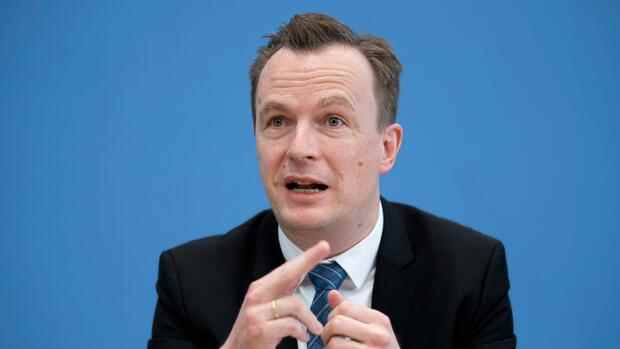Berlin The order by Russian President Vladimir Putin that EU states and the USA can only pay their gas bills in rubles could have a significant impact. Further details on Putin’s plan are not yet known, the implementation should be worked out within a week.
In principle, however, the announcement could indirectly force the West to decide either to circumvent its own sanctions or to boycott Russian gas, which would have significant consequences for Germany in particular.
So far, Russian gas suppliers, especially Gazprom, have been paid primarily in dollars. The Russian supplier then has to exchange most of the payment for rubles with the Russian central bank. Putin now wants the West to pay Gazprom and Co in rubles. But there is not enough Russian currency on the international financial markets, writes economist Jens Südekum on Twitter. The only alternative then is to get the rubles directly from the Russian central bank.
However, the West has been sanctioning them for a few weeks and freezing the currency reserves. “In this way, Putin is indirectly forcing us to circumvent our own sanctions,” says Südekum, who is a member of the scientific advisory board of the Federal Ministry of Economics.
Top jobs of the day
Find the best jobs now and
be notified by email.
It is possible that tough counter-sanctions from the West can keep Putin from pursuing his plan, which many consider unlikely given the experiences of the past few weeks.
And so there is possibly only one alternative to circumventing its own sanctions: a gas embargo on the part of the West. The federal government in particular has so far resisted this measure because it fears significant upheavals for the German economy and consumers. Germany gets more than half of its natural gas from Russia.
The Bonn economist Moritz Schularick considers an embargo in view of the most recent development to be the only alternative. “In this way, we importers are drawn even deeper into the Putin system. Get out!” says Schularick.
It is unclear to what extent the measure will help the Kremlin boss or whether he only wants to harm the West. So far it’s been like this: if Gazprom receives dollars for a gas delivery and exchanges them for rubles at the central bank, the rubles are just as much on the market as if the West exchanged its dollars for rubles directly.
But the former economist Peter Bofinger says: “If we have to buy the rubles on the foreign exchange market, that immediately strengthens the exchange rate of the ruble.” For Putin, there is no danger that the dollars will end up in accounts that the West sanctions and thus from being exchanged for rubles.
In fact, the announcement promptly strengthened the Russian currency, which is under massive pressure.
“Unfriendly States” Rule
Despite the change in the payment method, gas deliveries would continue to be fully guaranteed, Putin assured in a government video conference on Wednesday, which was broadcast on state television. Payment for Russian goods in foreign currency has lost its meaning.
The “unfriendly states” blacklisted by Russia are affected. This includes Germany and all other EU countries, but also the USA, Canada and Great Britain. The announcement promptly strengthened the Russian currency, which is under massive pressure.
The central bank and the Russian government now have a week to determine the modalities for switching from foreign exchange payments to ruble payments, Putin said. The West itself has devalued its currencies by freezing Russian assets abroad.
As a reaction to the Western sanctions, the Russian government had already decided at the beginning of the month that its own financial obligations to “unfriendly states” would only be settled in rubles. These include Ukraine, Switzerland and Japan.
More: No delivery commitment, but good signals: Habeck agrees long-term energy partnership with Qatar
